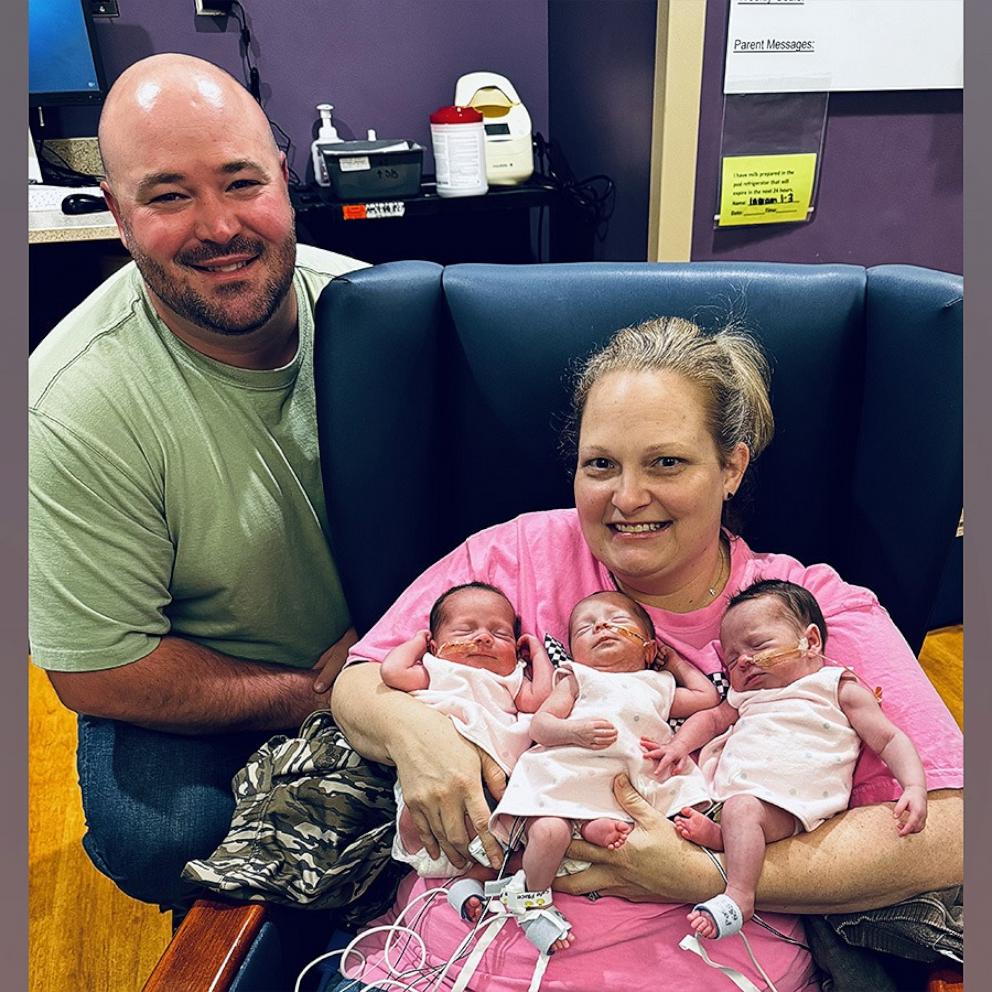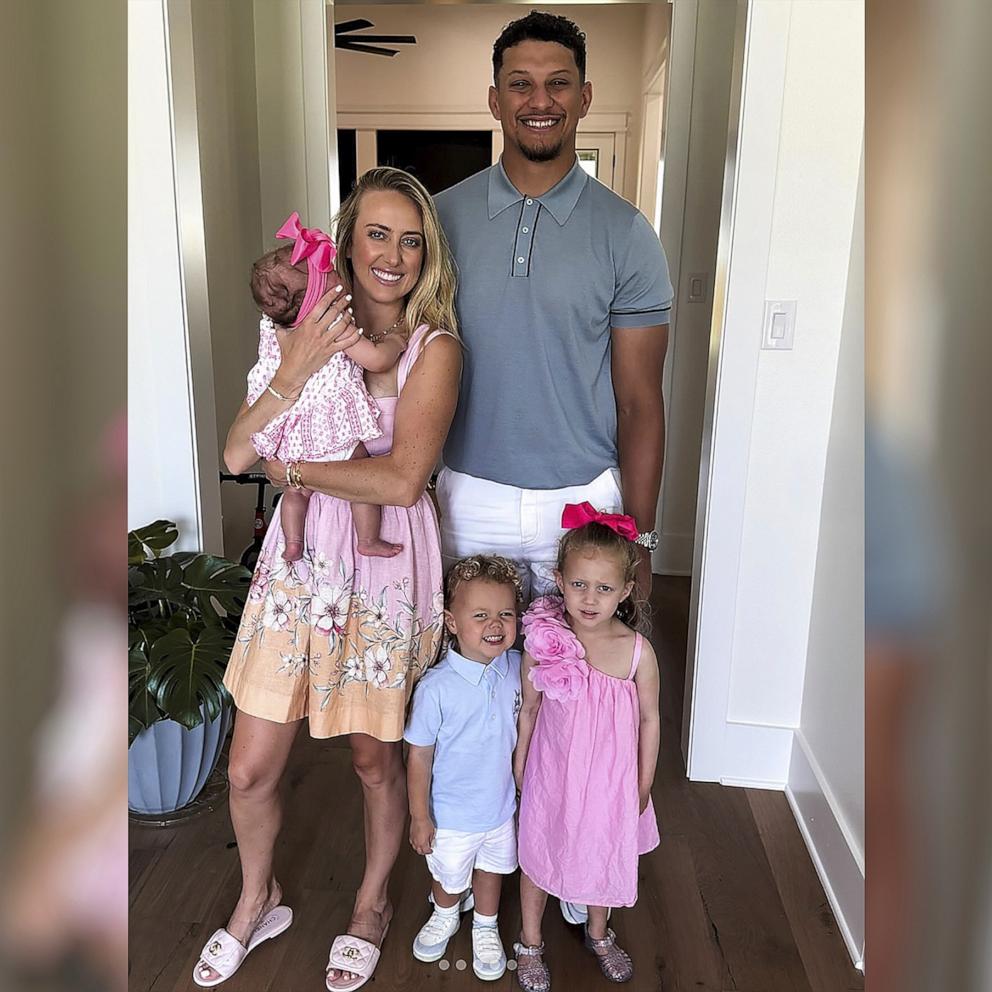Mom welcomes triplets after 10 years of thinking she couldn't have any more kids
An Alabama mom welcomed triplets this year after thinking for nearly 10 years that she couldn't have any more kids.
Brittany Ingram, 36, and her husband Josh Ingram, 34, of Deatsville, Alabama, had their eldest child, a son named JB, in 2015. In February this year, the couple welcomed identical triplet daughters Emersyn Claire, Adalyn Renae and Layla Michele.

Brittany Ingram's triplet pregnancy was a shock the couple hadn't seen coming. However, the mom of four said she had dreamt she would have triplets before her doctor confirmed her second pregnancy.
"I had a dream we were having triplets. I woke up and told my husband … He said, 'Oh my gosh. What would we do? Don't dream stuff like that,'" Ingram recalled to "Good Morning America." "When we went to [get] the … ultrasound … [the doctor] said, 'There's three babies. I've never seen this before. We studied about it in school but we've never seen three babies.'"
"[My husband and I] were both just, like, excited, scared and it took us a few days to process it," she continued. "None of our family believed us when we came home and told them."
The family had a valid reason to be shocked by the happy news. Ingram said she had been diagnosed with endometriosis and polycystic ovary syndrome, or PCOS, in 2015, conditions where there is abnormal tissue growth in the uterus and cysts develop on the ovaries. Both endometriosis and PCOS can impact a woman's reproductive health and lead to infertility, according to the Centers for Disease Control and Prevention.
The stay-at-home mom told "GMA" she underwent a laparoscopy to remove cysts in 2015, and when she and her husband got pregnant naturally the first time, they were surprised.
Ingram said doctors then told her she would have to undergo more surgeries or turn to fertility treatments in the future if she wanted to get pregnant again.
"After JB, we tried again a few more times, and I had a miscarriage, and it just didn't work -- and that was so heartbreaking," said Ingram.
"We were just kind of leaving it up to God, and saying, 'If it's meant to be, it'll be. If it's not, it won't,'" she added. "So, after 10 years, we just thought JB was going to be our one and only [child]."

In August 2024, everything changed for the Ingrams. Brittany Ingram took a pregnancy test the week of her 36th birthday and then visited her obstetrician to confirm she was indeed pregnant, where she learned she was expecting triplets.
Ingram's triplet pregnancy was considered high-risk because of her higher maternal age and the type of triplet pregnancy she had, according to Dr. Ayodeji Sanusi, a maternal-fetal medicine specialist at the University of Alabama at Birmingham and one of Ingram's doctors, who called the pregnancy "extremely rare."
"All three babies shared a single placenta -- a condition known as monochorionic triamniotic triplets," Sanusi told "GMA" via email. "This occurs when one fertilized egg splits twice, resulting in three fetuses with one shared placenta. It's an extremely rare phenomenon, with an estimated incidence of only 1 in 100,000 to 200,000 pregnancies."

Ingram said at 19 weeks, doctors told her to go on bed rest, and then at 22 weeks, she went into early labor. Doctors treated her with a cerclage, a type of surgery where surgeons temporarily sew the cervix closed to help prolong a pregnancy, according to the American College of Obstetricians and Gynecologists.
"In select cases -- like Brittany's -- when the cervix begins to dilate painlessly in the second trimester, limited data suggest that cerclage placement may help prolong the pregnancy," said Sanusi. "After a thorough and thoughtful discussion with her and her partner about the risks, benefits, and uncertainties of cerclage in this context, they chose to proceed. We believe the cerclage played a significant role in helping her carry the pregnancy to 30 weeks, when the babies were safely delivered."

Ingram said after delivery, she experienced complications, including postpartum preeclampsia, cardiomyopathy and heart failure, so she was re-admitted to the hospital for treatment, and doctors were able to stabilize her and prescribe her medications.
The triplets also had to stay in the hospital's neonatal intensive care unit for about two months before they could go home.
Now, Ingram said the triplets are all "perfectly healthy," according to their pediatrician, and all four of the Ingram kids are adjusting to their new life together.
For other families facing infertility, Ingram said she wanted to share her story to encourage them to have hope.
"Don't give up. There's always hope," she said. "Just because it's not on your timing doesn't mean it's not ever going to happen."







